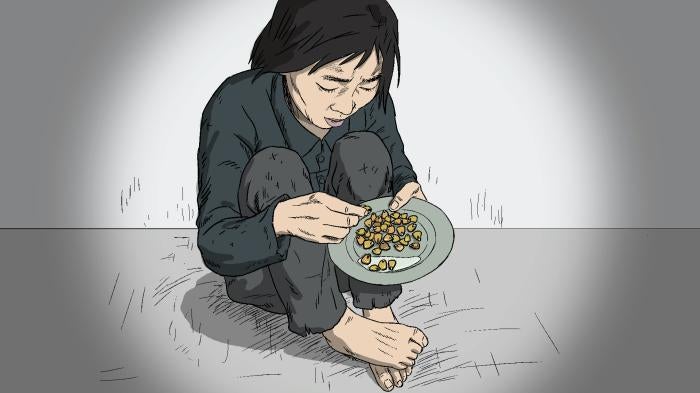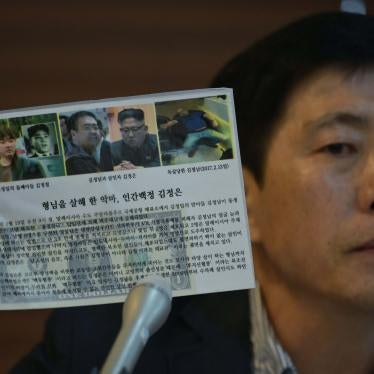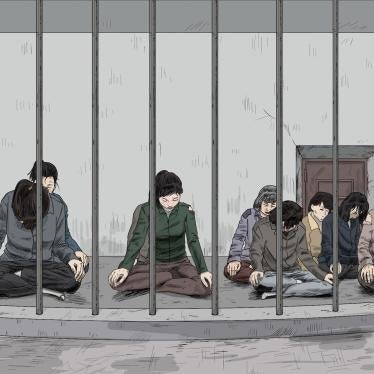(Seoul) – The North Korean pretrial detention and investigation system is arbitrary and lacks any semblance of due process, Human Rights Watch said in a report released today. Former detainees described systematic torture, dangerous and unhygienic conditions, and unpaid forced labor.
The 88-page report, “‘Worth Less Than an Animal’: Abuses and Due Process Violations in Pretrial Detention in North Korea,” provides a unique and detailed description of the country’s opaque criminal justice system. It highlights North Korea’s weak legal and institutional framework, and the political nature of the courts and law enforcement agencies under the ruling Workers’ Party of Korea.
“North Korea’s pretrial detention and investigation system is arbitrary, violent, cruel, and degrading,” said Brad Adams, Asia director. “North Koreans say they live in constant fear of being caught in a system where official procedures are usually irrelevant, guilt is presumed, and the only way out is through bribes and connections.”
Human Rights Watch interviewed eight former government officials who fled the country and 22 North Koreans – 15 women and 7 men – held in detention and interrogation facilities (kuryujang) since 2011, when the country’s current leader, Kim Jong Un, took power.
Former detainees told Human Rights Watch that they had no way of knowing what would happen to them once they were arrested, had no access to an independent lawyer, and had no way of appealing to the authorities about torture or violations of the criminal procedure law. Once an individual faces an official investigation there is little chance of avoiding a sentence of short-term or long-term unpaid forced labor. Some female detainees reported sexual harassment and assault, including rape.
Former detainees said they were forced to sit still on the floor for days, kneeling or with their legs crossed, fists or hands on their laps, heads down, and with their eyes directed to the floor. If a detainee moved, guards punished the person or ordered collective punishment for all detainees.
Four former government officials said that the ruling Workers’ Party of Korea considers detainees to be inferior human beings, and therefore unworthy of direct eye contact with law enforcement officers. They are referred to by a number instead of their names.
“If we moved, we were punished by standing and sitting, doing push-ups, abdominals, or holding onto the metal bars,” said a former soldier who left North Korea in 2017 after being detained multiple times for smuggling and trying to escape to South Korea. He added:
Some guards made us put our face between the bars or hit our fingers through the bars with a stick or with the gun. If they were really upset, they’d come into the cell and beat us. This happened every day, if not in our cell in the others, we could hear it, it was to maintain tension.… There were times I was almost about to give up on life.… While I was there, more than 50 detainees disappeared [into the political prison camp system].
The people interviewed described unhealthy and unhygienic detention conditions: very little food; overcrowded cells with insufficient floor space to sleep; little opportunity to bathe; and a lack of blankets, clothes, soap, and menstrual hygiene supplies. Former detainees and police officers described detainees being covered by lice, bedbugs, and fleas. Many detainees said guards or interrogators, often after demanding bribes, unofficially allowed family members or friends to provide food or other essentials after questioning ended.
The North Korean government should end endemic torture and cruel, inhuman, and degrading treatment in pretrial detention and interrogation facilities, Human Rights Watch said. The government should also improve abysmal detention and prison conditions and ensure basic standards of hygiene, health care, nutrition, clean water, clothing, floor space, light, and heat.
In 2014, a United Nations Commission of Inquiry on human rights in North Korea found that systematic, widespread, and gross human rights violations committed by the North Korean government constituted crimes against humanity.
“Former government officials told Human Rights Watch that mistreatment and humiliation are considered a crucial part of the North Korean criminal justice system,” Adams said. “The North Korean authorities should bring the system out of the dark ages by asking for international assistance to create a professional police force and investigative system that relies on evidence instead of torture to solve crimes.”
Selected Accounts from the Report:
A former government worker who escaped in 2018 was detained by secret police at a detention and interrogation facility in a border city with China in 2011 and 2012 because someone reported he was a spy. He told Human Rights Watch that:
They put me in a waiting cell. It was small and I was alone. They searched my body. Afterwards, the head of the city’s secret police department, the party’s political affairs head, and the investigator came in. It was very serious, but I didn’t know why. They just beat me up for 30 minutes, they kicked me with their boots, and punched me with their fist, everywhere on my body.…
The next day they moved me to the next room, which was a detention and interrogation facility cell, and my preliminary examination started. But the questioning didn’t really have any protocols or procedures. They just beat me…. The preliminary examiner hit me violently first…. I asked, “Why? Why? Why?” but I didn’t get an answer…. As the questioning went on, I found out that I had been reported as a spy. Violent beatings and hitting were constant in the beginning of [the preliminary examination] questioning for one month. They kicked me with their boots, punched me with their fist or hit me with a thick stick, all over my body. After [when they had most of my confession ready], they were gentler.
It was winter, but there was no heating. There was only one small wood heater right in front of us, next to the guard. It was so cold … and nobody knew where we were, so we couldn’t get anything from outside. It was really cold, but it was worse because there were so many bedbugs and other bugs that bit you.
A former lumberjack who escaped in 2014 and was detained by the police twice, in 2010 for smuggling and in 2014 for not going to work at a government-sanctioned workplace, said:
Every single day was horrible, so painful and unbearable [from being immobilized].… Many times, if I or others moved [in the cell], the guards would order me or all the cellmates to extend our hands through the cell bars and would step on them repeatedly with their boots or hit our hands with their leather belts. Even then we weren’t allowed to move. If we responded and they didn’t like us, they’d beat us up.
A former trader who escaped in 2017 and was detained by police twice in Suncheon, South Pyongan province, in the early 2010s for selling banned products, and in 2016 for getting into a fight with a party member with better connections than hers, said that:
All toiletries came from the homes of the detainees. After detention, the police informed the families and the investigator in charge went over and brought things like soap, toothpaste, toothbrushes, towels, or menstrual pads. [The guards] broke the body of the toothbrush and would only leave the head [to avoid it being used to commit suicide]. The people without family didn’t have toiletries and had to use the things of other detainees.
We were all in similar situations, so we women shared our things, but I heard that men didn’t, that the men that didn’t have relatives suffered more and were all covered by lice, but the other men didn’t care [and didn’t share]. [The first time I was detained,] family members could send [menstrual] pads. One detainee [who had no relatives] had to wash a sock and use it as a [menstrual] pad. In 2016, we could ask the police officer in charge for pads during our period and the officer would go to the store outside and buy them. We didn’t have to give money, they just bought them for us.









